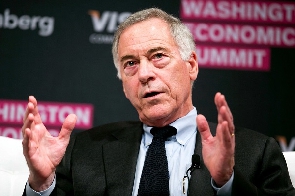 Prof. Steve Hanke is an economist
Prof. Steve Hanke is an economist
An economist, Prof. Steve Hanke, cast a shadow of doubt on the effectiveness of Ghana's deal with the International Monetary Fund.
He projected that, just like other IMF programmes the country has had in the past, the current one was bound to fail.
Read the full story originally published on July 3, 2022, by GhanaWeb
Ghana has turned to the IMF 17 times
Ghana facing economic distress
Ghana cedi is a central bank junk currency, Steven Hanke
A renowned international economist at the Johns Hopkins University in the USA, Professor Steve Hanke, has stated Ghana’s decision to enter an economic programme with the IMF will not salvage the economy.
He predicts that a financial bailout from the Bretton Woods Institution is likely to fail just like the previous 17 IMF programmes that Ghana has participated in.
In a July 2 tweet sharing his view on the government’s decision to commence formal negotiations with the IMF for a bailout, Steve Hanke questioned Ghana’s last-ditch effort to save the economy which is in distress and saddled with a huge debt burden.
“Today, I measure inflation in Ghana at a stunning 49.35%/yr. In a last-ditch effort, the government has begun negotiations with the IMF on a bailout deal. SPOILER ALERT: Another IMF loan won't save Ghana’s economy. Like its past 17 IMF programs, a new one will fail.”
Today, I measure inflation in Ghana at a stunning 49.35%/yr. In a last ditch effort, the govt. has begun negotiations w/ the IMF on a bailout deal. SPOILER ALERT: Another IMF loan won't save GHA's economy. Like its past 17 IMF programs, a new one will fail.https://t.co/wpiLLIc6Nb
— Steve Hanke (@steve_hanke) July 2, 2022
In a separate tweet on July 2, the renowned American economist ranked the Ghana cedi in 16th place out of 18 other currencies on his Currency Watchlist – due to the persistent depreciation of the currency.
“#Ghana is in 16th place in this week's Hanke’s #CurrencyWatchlist. By my calculations, the #cedi has depreciated ~29% against the USD since January 2020,” Steve Hanke shared.
“The Ghanaian cedi is a central bank junk currency,” the Johns Hopkins University economist added.
Meanwhile, Ghana’s finance minister, Ken Ofori-Atta has come under intense pressure over the management of the economy which is now seeking formal engagements with the International Monetary Fund for a financial bailout.
Despite stiff opposition against a return to the IMF earlier, President Nana Addo Dankwa Akufo-Addo on July 1 authorized the finance minister [Ken Ofori-Atta] to engage the IMF for an economic programme.
The IMF in response to the decision indicated its preparedness to assist Ghana on the path of its economic recovery.
In a social media post on July 1, the IMF Resident Representative for Ghana, Dr. Albert Touna-Mama, confirmed that the Ghanaian authorities have reached out to the Bretton Woods Institution.
He also mentioned that the Fund was ready to assist Ghana government to restore macroeconomic stability and safeguard debt sustainability for the country.
"We can confirm that the authorities have been in touch to request Fund’s support to #Ghana’s own economic program. The #IMF stands ready to assist #Ghana to restore macroeconomic stability; safeguard debt sustainability; promote inclusive and sustainable growth; and face the impact of the war in #Ukraine and the lingering pandemic. We are looking forward to meeting with the authorities in the coming weeks to start the initial discussions,” Dr. Albert Touna-Mama tweeted.
Government and IMF officials are expected to in the coming weeks meet to begin the formal discussions.
#Ghana is in 16th place in this week's Hanke’s #CurrencyWatchlist. By my calculations, the #cedi has depreciated ~29% against the USD since Jan. 2020. The Ghanaian cedi is a central bank junk currency. pic.twitter.com/n9sGMfOZeq
— Steve Hanke (@steve_hanke) July 2, 2022